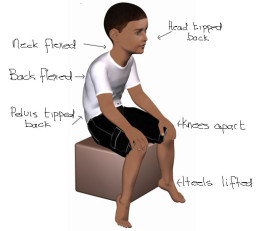What is “Low Muscle Tone” and what can I do about it?
By dinamk on March 16, 2015 in Informative Blogs with No Comments
What is “Low Muscle Tone” and what can I do about it?
Find out what exactly is Low Muscle Tone and what it means for your child.
By Aimee York. You can find her on Google+.
Low Muscle Tone (hypotonia) often gets thrown around as a bit of a “buzz word” in therapy these days. Often it can cause anxiety in parents, often it causes confusion, and often it comes with a negative connotation. This blog will debunk the myths associated with Low Muscle Tone and provide practical strategies to address it.
Muscle tone is different to muscle strength which is to do with power. A child with low muscle tone is often to be observed to slouch in their chair, hold their head up constantly with their hand, have trouble sitting for long periods of time, and often ‘w-sit’ instead of crossing their legs.

As a result, the child’s muscle needs to go through a greater range of motion and, as a result, more energy is used. On top of this, it often takes greater stimulation for the muscle to activate, which also increases the response time of the muscle and it directly influences the child’s performance abilities. The use of extra energy contributes to the decrease in the child’s endurance.
Now you know the basics, here are some Myth’s and Fact’s about Low Muscle Tone:
MYTH: I’m a bad parent because my child has Low Muscle Tone
FACT: You’re most definitely not. Humans are born with a certain level of muscle tone.
MYTH: Low Muscle Tone means my child is unfit and unhealthy.
FACT: Low Muscle Tone has nothing to do with a child’s health or fitness level.
MYTH: Low Muscle Tone is the end of the world and a horrible diagnosis.
FACT: Low Muscle Tone is not a formal diagnosis, simply more of a ‘characteristic’, and is definitely not the end of the world! What can be diagnosed is the cause.
Low Muscle Tone cannot be changed, but with therapy, muscles can become stronger (“strength”) and compensate for low tone to help your child through daily tasks. Children with low muscle tone often have delayed motor skills, muscle weakness, and / or coordination problems.
KinderCloud provides online Occupational Therapy, Counselling, and Dietetics for children and families. Contact our occupational therapist today on info@kindercloud.com.au for assistance on how to support your child with low muscle tone.
Facebook: Kinder Cloud
Website : Kinder Cloud
Facebook Feed
Featured App
Sentence Builder - Kindergarten, First Grade, Second Grade
A fun new sentence builder app to learn about words, sentences, pronunciation, grammar, and punctuation.
The ONLY sentences app that can be fully customized with your own pictures, words and sentences.
We worked closely with teachers, parents and kids to design and test this app.
Read more
Latest App
Physical Science for Second Grade
![]()
- The ONLY app that allows the users to CREATE their own stories, questions and add their own images.
- The ONLY app that READS the stories, comprehension questions and choices.
Reading Comprehension Physical Science for Second Grade has twenty stories about the physical science related young children's daily life. You can also create and add your own stories to the app.
Read more
© Copyright 2025. All rights reserved. Powered by AbiTalk.


